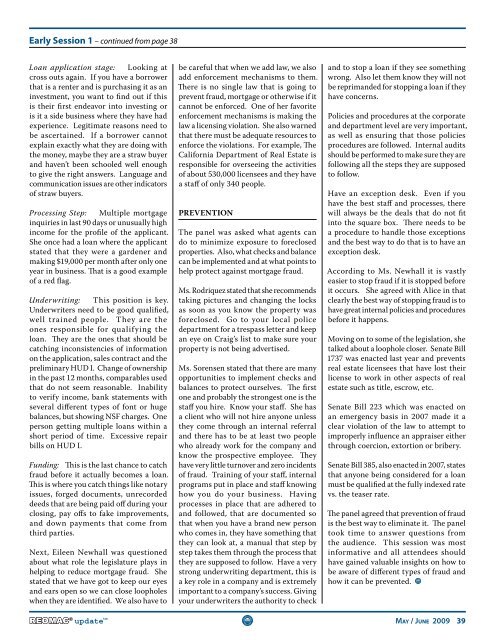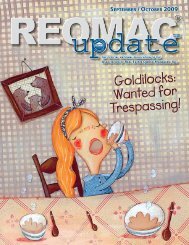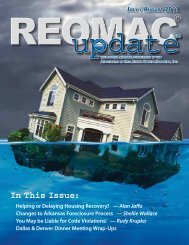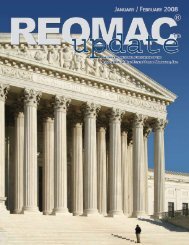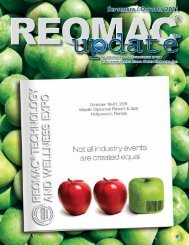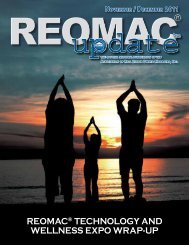Spring Conference Review - reomac
Spring Conference Review - reomac
Spring Conference Review - reomac
You also want an ePaper? Increase the reach of your titles
YUMPU automatically turns print PDFs into web optimized ePapers that Google loves.
Early Session 1 – continued from page 38<br />
Loan application stage: Looking at<br />
cross outs again. If you have a borrower<br />
that is a renter and is purchasing it as an<br />
investment, you want to find out if this<br />
is their first endeavor into investing or<br />
is it a side business where they have had<br />
experience. Legitimate reasons need to<br />
be ascertained. If a borrower cannot<br />
explain exactly what they are doing with<br />
the money, maybe they are a straw buyer<br />
and haven’t been schooled well enough<br />
to give the right answers. Language and<br />
communication issues are other indicators<br />
of straw buyers.<br />
Processing Step: Multiple mortgage<br />
inquiries in last 90 days or unusually high<br />
income for the profile of the applicant.<br />
She once had a loan where the applicant<br />
stated that they were a gardener and<br />
making $19,000 per month after only one<br />
year in business. That is a good example<br />
of a red flag.<br />
Underwriting: This position is key.<br />
Underwriters need to be good qualified,<br />
well trained people. They are the<br />
ones responsible for qualifying the<br />
loan. They are the ones that should be<br />
catching inconsistencies of information<br />
on the application, sales contract and the<br />
preliminary HUD I. Change of ownership<br />
in the past 12 months, comparables used<br />
that do not seem reasonable. Inability<br />
to verify income, bank statements with<br />
several different types of font or huge<br />
balances, but showing NSF charges. One<br />
person getting multiple loans within a<br />
short period of time. Excessive repair<br />
bills on HUD I.<br />
Funding: This is the last chance to catch<br />
fraud before it actually becomes a loan.<br />
This is where you catch things like notary<br />
issues, forged documents, unrecorded<br />
deeds that are being paid off during your<br />
closing, pay offs to fake improvements,<br />
and down payments that come from<br />
third parties.<br />
Next, Eileen Newhall was questioned<br />
about what role the legislature plays in<br />
helping to reduce mortgage fraud. She<br />
stated that we have got to keep our eyes<br />
and ears open so we can close loopholes<br />
when they are identified. We also have to<br />
be careful that when we add law, we also<br />
add enforcement mechanisms to them.<br />
There is no single law that is going to<br />
prevent fraud, mortgage or otherwise if it<br />
cannot be enforced. One of her favorite<br />
enforcement mechanisms is making the<br />
law a licensing violation. She also warned<br />
that there must be adequate resources to<br />
enforce the violations. For example, The<br />
California Department of Real Estate is<br />
responsible for overseeing the activities<br />
of about 530,000 licensees and they have<br />
a staff of only 340 people.<br />
PREVENTION<br />
The panel was asked what agents can<br />
do to minimize exposure to foreclosed<br />
properties. Also, what checks and balance<br />
can be implemented and at what points to<br />
help protect against mortgage fraud.<br />
Ms. Rodriquez stated that she recommends<br />
taking pictures and changing the locks<br />
as soon as you know the property was<br />
foreclosed. Go to your local police<br />
department for a trespass letter and keep<br />
an eye on Craig’s list to make sure your<br />
property is not being advertised.<br />
Ms. Sorensen stated that there are many<br />
opportunities to implement checks and<br />
balances to protect ourselves. The first<br />
one and probably the strongest one is the<br />
staff you hire. Know your staff. She has<br />
a client who will not hire anyone unless<br />
they come through an internal referral<br />
and there has to be at least two people<br />
who already work for the company and<br />
know the prospective employee. They<br />
have very little turnover and zero incidents<br />
of fraud. Training of your staff, internal<br />
programs put in place and staff knowing<br />
how you do your business. Having<br />
processes in place that are adhered to<br />
and followed, that are documented so<br />
that when you have a brand new person<br />
who comes in, they have something that<br />
they can look at, a manual that step by<br />
step takes them through the process that<br />
they are supposed to follow. Have a very<br />
strong underwriting department, this is<br />
a key role in a company and is extremely<br />
important to a company’s success. Giving<br />
your underwriters the authority to check<br />
and to stop a loan if they see something<br />
wrong. Also let them know they will not<br />
be reprimanded for stopping a loan if they<br />
have concerns.<br />
Policies and procedures at the corporate<br />
and department level are very important,<br />
as well as ensuring that those policies<br />
procedures are followed. Internal audits<br />
should be performed to make sure they are<br />
following all the steps they are supposed<br />
to follow.<br />
Have an exception desk. Even if you<br />
have the best staff and processes, there<br />
will always be the deals that do not fit<br />
into the square box. There needs to be<br />
a procedure to handle those exceptions<br />
and the best way to do that is to have an<br />
exception desk.<br />
According to Ms. Newhall it is vastly<br />
easier to stop fraud if it is stopped before<br />
it occurs. She agreed with Alice in that<br />
clearly the best way of stopping fraud is to<br />
have great internal policies and procedures<br />
before it happens.<br />
Moving on to some of the legislation, she<br />
talked about a loophole closer. Senate Bill<br />
1737 was enacted last year and prevents<br />
real estate licensees that have lost their<br />
license to work in other aspects of real<br />
estate such as title, escrow, etc.<br />
Senate Bill 223 which was enacted on<br />
an emergency basis in 2007 made it a<br />
clear violation of the law to attempt to<br />
improperly influence an appraiser either<br />
through coercion, extortion or bribery.<br />
Senate Bill 385, also enacted in 2007, states<br />
that anyone being considered for a loan<br />
must be qualified at the fully indexed rate<br />
vs. the teaser rate.<br />
The panel agreed that prevention of fraud<br />
is the best way to eliminate it. The panel<br />
took time to answer questions from<br />
the audience. This session was most<br />
informative and all attendees should<br />
have gained valuable insights on how to<br />
be aware of different types of fraud and<br />
how it can be prevented.<br />
REOMAC ® update tm Ma y / Jun e 2009 39


